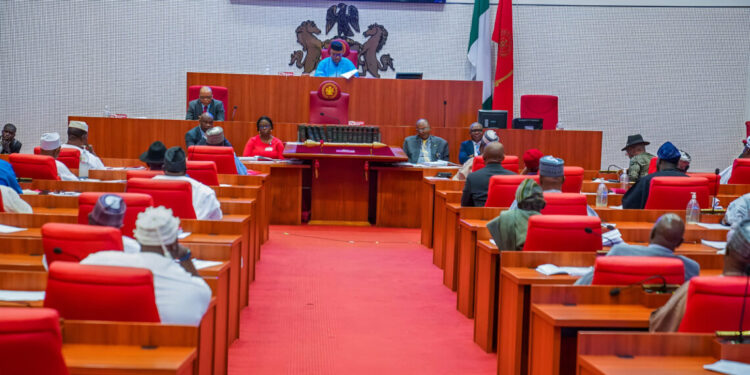The Senate is investigating N30 trillion ways and means disbursed in the last administration.
The committee is chaired by Sen Jibrin Isah (Kogi East) while Sen Ekpeyong Asuquo; Mohammed Tahir Monguno; Victor Umeh; Olamilekan Adeola; Sani Musa; Aliyu Wadada; Abdul Ningi; Ipalibo Banigo and Banigo Harry.
The ad-hoc committee were given four weeks to turn in their report for legislative debate on how the N30 trillion was disbursed.
This follows the adoption of the resolution of last week Tuesday on the need to probe the ‘Ways and Means’ spending during the former President Buhari’s administration.
The ‘Ways and Means’ is an overdraft taken directly from the Central Bank of Nigeria to solve contingency needs of the nation following approval and directive of the executive arm of government which would have to be ratified by the parliament.
However, last week’s debate on ‘Ways and Means’ snowballed into confusion and rowdy session when the motion was raised without details of how the fund was spent, a development that infuriated Senator Ali Ndume representing Borno South Senatorial district who insisted that details of ‘Ways and Means’ must be provided according to parliamentary rules.
In his remark before announcing membership of the Committee, the Deputy Senate President, Jibrin Barau who presided over the plenary in absence of Senate President, Godswill Akpabio, lamented alleged reckless spending that had caused inflation in the country.
He said, ‘Ways and Means’ would continue to be recorded in the balance sheet of the Central Bank of Nigeria, until it is completely liquidated, while he tasked the committee to do a thorough job with a view to recover the fund.
He said: “According to statistics, broad money supply, which is a key parameter for key inflationary trends, increased from N78.3 trillion to 78.4 trillion in 2023, the highest ever recorded in Nigeria. The Central Bank of Nigeria’s Ways and Means which provides direct lending to the Federal Government of Nigeria causes unprecedented liquidity in the economy and the current inflationary pressure that we are experiencing.
“The financial obligation to the CBN now stands at N30 trillion. The inability to repay this temporary accommodation by the Federal Government of Nigeria led to the regularization of a 40 year loan at 9 percent interest per annum.
“By implication, this debt will appear in the balance sheet of CBN for the next 40 years until liquidated. It is therefore imperative to interrogate the loans of the N30 trillion Ways and Means with a possibility of recovering whatever possible.”











